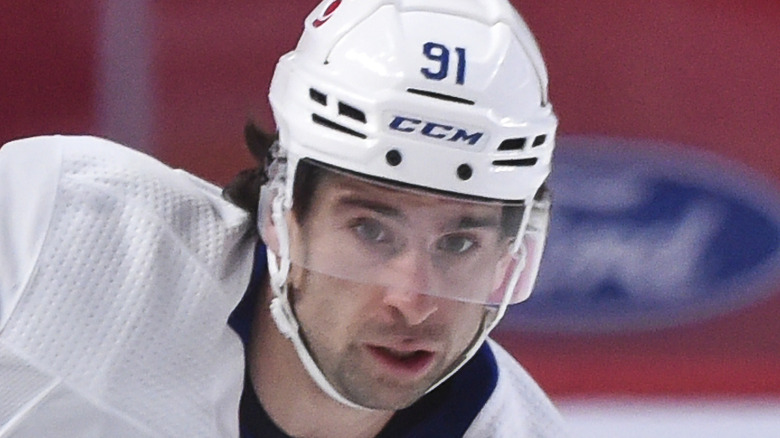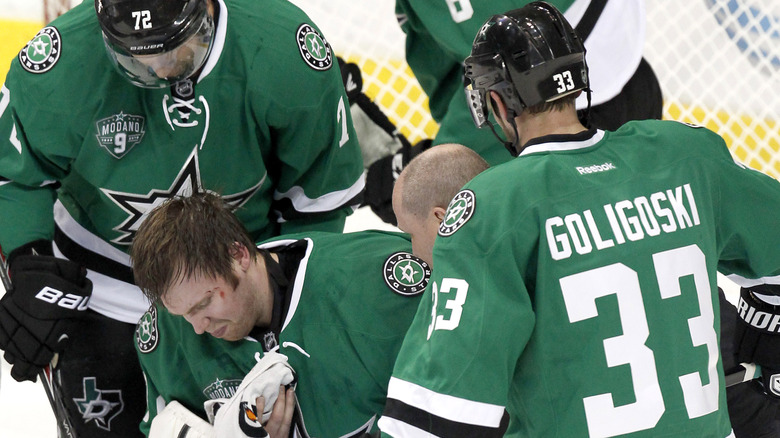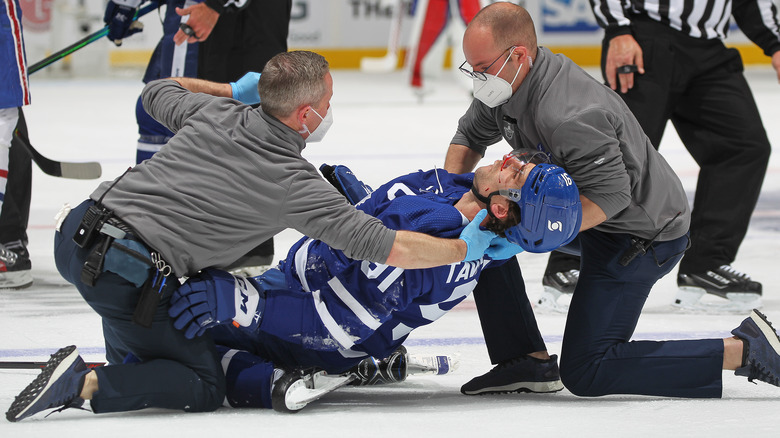Toronto Maple Leafs Captain John Tavares' Head Injury Explained
John Tavares' hockey career was put on hold indefinitely on Thursday, May 20. As reported by The Hockey News, a Sports Illustrated site, the captain of the Toronto Maple Leafs hit the ice after taking a hit from a Montreal Canadiens defenseman. The hit itself didn't do much damage to Tavares. But he tried to get back up at the same time a second Canadiens defenseman jumped clear of him. The end result was the defenseman's knee slamming into Tavares' head and sending him back to the ice.
Witnesses said that at first Tavares didn't move, bringing play to a screeching halt. Teammates and medics rushed to the player's side where they found him conscious but apparently concussed. When Tavares tried to get up they encouraged him to stay on the ice until he could be moved to a stretcher. He was then taken to St. Michael's Hospital where he was examined by the neurosurgical team as well as the team's medical director, according to a statement released through the Toronto Maple Leafs' official Twitter account.
You might be thinking that having neurosurgeons on hand to check out a concussion is a bit excessive. After all, aren't concussions sort of expected when you play sports? You'd be right that concussions are common. But the reaction to Tavares' head injury is far from excessive considering the long-term effects of concussions and the NHL's stance on the issue.
Concussions by the numbers
John Tavares is far from the first hockey player to experience a concussion. He's not even the first this month. According to CBS Sports' NHL Injury Tracker, nine players suffered concussions by the time Tavares was injured. That number may be higher as many injuries are listed as "undisclosed." Despite these numbers, however, the NHL holds firm that they do not see a link between professional hockey and an increased risk of concussions as they reaffirmed after reaching a settlement with over 300 players and their families in 2019.
The settlement, as reported by CBC Canada, closed a four-year legal battle. The plaintiffs said that the NHL did not adequately warn them of how easy it was to suffer a concussion when playing hockey. Players also said that the league didn't do enough to protect them once they were already playing and that they were never warned about the long-term effects of repeated concussions.
According to the Mayo Clinic, the symptoms are severe. They include anxiety, fatigue, irritability, and sensitivity to light and smell. Worse still, a 2016 study in Current Sports Medicine Reports found that hockey players who suffered multiple concussions suffered increased rates of dementia and memory loss in old age. Despite all of this, the NHL denies their players are at risk.
The long-term effects of athletic concussions
Steve Montador played 14 years in the NHL until a concussion effectively ended his professional career in 2012. Three years later, at the age of 35, he was found dead in this Calgary home. That year the Chicago Tribune reported that Mantador had struggled with depression, insomnia, and memory loss. He suspected the symptoms related to the 11 concussions he suffered while playing for the NHL but he couldn't prove it. So he arranged for his brain to be autopsied in the event of his death.
The autopsy revealed that Montador suffered from Chronic Traumatic Encephalopathy, also known as CTE. Boston University's CTE Center describes CTE as a degenerative condition that affects people with a history of repetitive concussions. The center specifically names athletes as one group more highly affected than any other. After his death and the discovery of CTE, Montador's family sued the NHL. The lawsuit was put on hold while the league settled their other concussion-related lawsuit. But Yahoo News did report that the NHL's official stance on Montador's eleven concussions were that they were the fault of Montador's own "lack of due care".
Nevertheless, it is widely believed that hockey players risk concussions and long-lasting, sometimes deadly side effects (via The Atlantic). Thankfully, John Tavares' team reacted as quickly and aggressively as they did. The player was released from the hospital and, as of this writing, is recovering at home, as Tavares revealed on Twitter.



